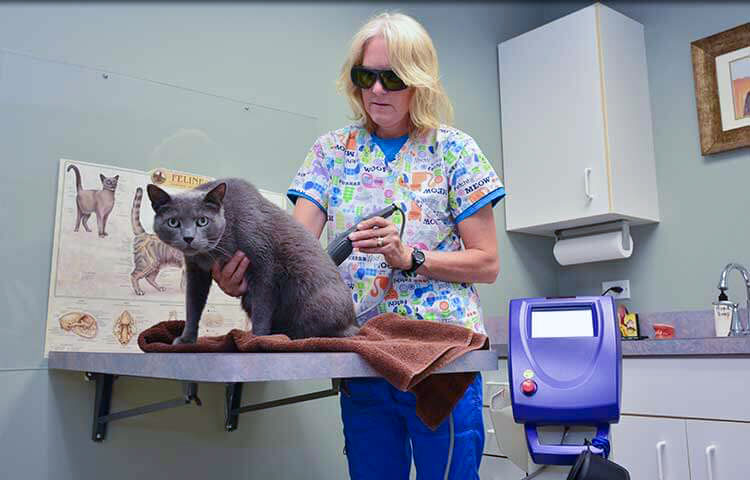General Veterinary Medicine
Crystal Lake & McHenry County IL Preferred Veterinarians
At Crystal Lake Veterinary Hospital, we understand how stressful it can be when your pet isn’t feeling well. From vomiting and diarrhea to arthritis, allergies, and metabolic diseases, our experienced team is equipped to diagnose and treat a wide range of common conditions. We begin with a thorough history and physical exam, followed by advanced diagnostics if needed, to pinpoint the problem and provide effective care. With expertise, state-of-the-art tools, and a compassionate approach, we’re here to help your pet get back to feeling their best.

Common Conditions
We know how scary it can be when our pets do not feel well. Whether it be vomiting, lethargy, or signs of pain, it is important to get your pet examined in order to identify the problem. There are many conditions that can afflict dogs and cats and, luckily, a majority of these problems can be diagnosed and treated. When we see your pet because he/she is sick, we will start by asking you questions to get a thorough history. Then our doctors will perform a physical exam. The history and physical exam offers important and vital information as to the cause of your pet’s illness. After that, diagnostics may be needed for more information. Among the many diseases and problems our pets can suffer from; there are many that we see most commonly.
Diarrhea and Vomiting
Diarrhea is very common in dogs and cats and it is frustrating to deal with at home. Diarrhea has many many causes including; parasites, bacteria, poor absorption, ingesting a foreign object, pancreatitis, or dietary indiscretion. One very common cause of diarrhea in dogs is an overgrowth of bacteria in the small intestine and/or colon. We start by testing the stool for any parasites or bacteria. Occasionally further diagnostics are necessary.
Arthritis or Lameness
It is difficult to watch our pet’s age and show signs of arthritis. Some signs you may notice at home include: hesitancy to jump up onto the couch, bed, or into the car. Also, it may become difficult for them to stand up from a laying down position. Occasionally your dog or cat may lick the areas that hurt like his wrists, knees, or elbows. What about when the pain seems localized to one leg and your pet is limping? Limping could also be a sign of arthritis, however, it could also be an acute injury. When your dog or cat comes in for limping, we will check to see if one particular joint is painful or swollen and most often times proceed with x-rays.
About Laser Therapy
When your pet has been diagnosed with arthritis or joint pain and inflammation, there is a non-invasive cutting edge therapy option. Laser therapy is a non-surgical treatment used to reduce pain, improve mobility, and enhance quality of life. Laser therapy does not require the use of drugs or surgery and has fewer side effects and fewer risks. It is safe, quick and convenient, and can be more effective than other forms of physical therapy. Laser therapy does not require sedation or restraint. Your pet can rest comfortably while our technician focuses an infrared wand across the top of your pet’s skin. They will target a specific calculated area surrounding the place where your pet is painful.
Conditions that can be improved with Laser Therapy
- Arthritis
- Acute or chronic pain
- Back pain
- Sprains or strains
- Inflammation and edema
- Wounds
If you are interested in this type of therapy, please ask our staff if your pet is a candidate for laser treatments. Your pet is part of your family and we know you want them to have the best quality of life. We share this goal and are excited to offer laser therapy to help.
Allergies:
Is your pet itching and scratching? This can be extremely frustrating for you and your pet, especially when they are keeping you up at night scratching. There are many causes of itching. When we see your dog or cat for this problem, the doctors will first make sure he does not have any fleas or mites. Fleas and mites often times cause an intense itch. If he is free of these parasites, the next step is to determine if the problem is from an allergy. An allergy can be from an adverse reaction to the diet, or it can be from environmental causes. Unfortunately, there is no quick test to determine the cause of the allergy.
A thorough history can offer some insight and diet elimination trials may be performed if the doctor suspects a food allergy
Infectious disease
There are many microscopic bugs out in the world that can infect our pets. Many of them also can cause disease in us so too. Infections, whether it be from a bacteria, a fungus, or a parasite, may result in your dog or cat being lethargic, developing a fever, lameness, or cough. When your pet presents to us, often times bloodwork is performed to identify what body system is being affected. Then we can tailor additional testing or treatments based on lab results.
Some infectious diseases found in our region include:
Lyme disease
Ticks that carry the lyme bacteria can bite our dog and transmit the infection. Dogs that suffer from lyme disease may develop limping. The limping can be in one limb or multiple limbs. These dogs typically resolve with antibiotics. In rare cases, lyme disease can attack the kidneys causing kidney failure, this is much more serious and requires intense treatment. There is a vaccine available to help reduce the likelihood of disease. Like with all vaccines however, it is not a guarantee your dog cannot get lyme disease.
Heartworm disease
Heartworms are parasites that are transmitted via mosquitos. A mosquito that carries heartworm microfilaria has to bite your dog or cat. The microfilaria then enters the bloodstream of your pet where they settle in the heart to grow into adult worms that look like spaghetti. This disease is very serious and treatment is costly. We encourage monthly preventative to avoid your pet getting infected with heartworms.
Leptospirosis
Lepto is a bacteria that is excreted from rodent urine. It tends to harbor in quiet standing water. What do our dogs do when they are outside? They like to drink from puddles and ponds. Lepto can infect our dogs and attack the liver and/or kidneys. Often times, lepto infected dogs are lethargic, not eating, and may drink excessively. There is a vaccine available to help reduce the prevalence of the disease. We will discuss with you if your dog is at a higher risk of getting infected with leptospriosis.
Blastomycosis
This is a fungus found in the soil and can become a serious systemic infection in both dogs and humans. Dogs typically become infected by inhaling fungal spores in the soil. Most of the time dogs will clear the infection on their own, but for some dogs, the spore turns into a yeast in the body establishing an infection in the lungs. The yeast can then spread to other areas which include the skin, the lymph nodes, eyes, bone, and rarely the brain. Unfortunately there is no vaccine for this devastating disease. Our doctors may suspect blastomycosis if your dog is not eating, losing weight, has a fever, cough, or unexplained skin and eye lesions.
Metabolic disease
Metabolic diseases are common in our dog and cat family members. Metabolic disorders are when there is an abnormal chemical reaction or abnormal hormone production in the body. All the organs in the body have a unique job and produce or release chemicals or hormones to keep the body in check. When this is disrupted, many diseases can manifest.
Addisons disease
This disease happens when the adrenal gland (which in charge of producing cortisol) does not produce enough hormone. When your dog is low on cortisol and the other hormones that is produced by the adrenal gland, he can become weak, lethargic, and nauseous.
Cushings disease
This disease the opposite of Addison’s, and happens when the adrenal gland is producing too much cortisol hormone. Some signs of Cushing’s disease include increased thirst, panting, hair loss on trunk, and developing a pot-belly appearance. For both Addison’s and Cushing’s disease, they must be diagnosed with laboratory tests prior to treatment.
Diabetes
Many of us are familiar with diabetes if we know a friend or family member that suffers from it. This happens when there is not enough circulating insulin in the body or the cells in our body cannot recognize the insulin. Insulin’s responsibility is to lower blood sugar after a meal is ingested and metabolized. The most common clinical sign of diabetes in our dog and cat patients is drinking and urinating large amounts. A simple blood and urine test can diagnose the problem.
Thyroid disorder
The thyroid is a gland that is located in the neck. It is responsible for producing thyroid hormone, which is a major player in regulating metabolism. Dogs and cats develop exactly opposite problems when it comes to thyroid hormone production. As a rule, our canine patients will suffer from an underproduction of this hormone leading to weight gain, lethargy, and a poor hair coat. Our feline patients typically get an overproduction which as you can imagine leads to signs of increase metabolism such as weight loss, increased appetite, increased activity (vocalizing at night or more often). The doctors can discuss the signs and symptoms with you to determine if testing blood levels of thyroid hormone is appropriate.
Call us or book your appointment today!
It is our hope that we see you and your pet for wellness checks only, but if and when your animal becomes ill or suffers from a medical problem, we are equipped with the expertise of the doctors, imaging and laboratory testing, and a full in-house pharmacy to treat your pet.


